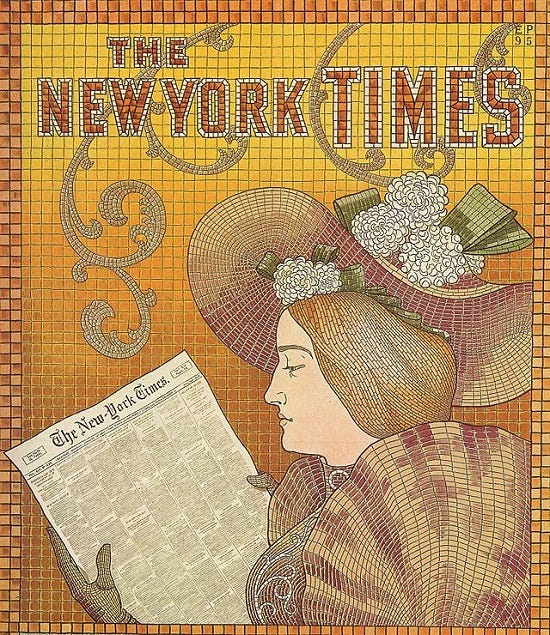Generative AI and Copyrights Clash in NYT Suit
The New York Times alleges massive copyright infringement in its case against OpenAI and Microsoft for how ChatGPT was trained on its content; is it a new ethical era for AI?
By John P. Desmond, Editor, AI in Business

In the first such challenge by a major American news organization, The New York Times filed suit on Dec. 27 against OpenAI and Microsoft alleging copyright infringement for illegal use of their intellectual property to build AI systems including ChatGPT.
The suit, filed in a Manhattan federal court, alleges that OpenAI “seeks to free-ride on the Times’s massive investment in its journalism by using it to build substitutive products without permission or payment,” according to an account in The Guardian. The “unlawful use” of the copyrighted material “threatens The Times,” the lawsuit states.
The lawsuit characterizes the independent journalism of the Times as “vital” to democracy, arguing that it is “increasingly rare and valuable.”
Launched in November 2022, ChatGPT experienced 100 million users in two weeks, and a year later, had more than 100 million users per week, according to the Guardian account.
OpenAI has been sued by more than a dozen authors in September, alleging ChatGPT incorporates their published works without permission, and the Getty photo archive sued a different AI firm over its use of their images in February.
The NYT lawsuit did not specify a specific damages amount but does state that OpenAI is responsible for “billions” in damages
The Times asked that any chatbot using copyrighted material from the Times be destroyed.
OpenAI Inks Content Partnerships with Axel Spring, AP
As tension over the use of copyrighted material to train ChatGPT began to mount, OpenAI has announced partnerships with certain partners, including the German publisher Axel Springer. In a press release on that agreement, OpenAI stated that ChatGPT users would receive “summaries of selected global news content” from certain Axel Springer content, and that the information “would include attribution and links to the full articles …”
Mathias Döpfner, CEO of Axel Springer. Stated, “We want to explore the opportunities of AI empowered journalism – to bring quality, societal relevance and the business model of journalism to the next level.”
In July, OpenAI announced an agreement had been reached to use some of the archive of AP, the Associated Press, a nonprofit news agency founded in 1846. In the arrangement, OpenAI will license part of AP’s text archive, going back to 1985, “while AP will leverage OpenAI’s technology and product expertise,” the two organizations stated in a release issued by AP.
“We are pleased that OpenAI recognizes that fact-based, nonpartisan news content is essential to this evolving technology, and that they respect the value of our intellectual property,” stated Kristin Heitmann, AP senior vice president and chief revenue officer. “AP firmly supports a framework that will ensure intellectual property is protected and content creators are fairly compensated for their work.”
The AP agreement was valuable to OpenAI for providing a hedge against losing access to material because of lawsuits, stated Nick Diakopoulos, a professor of communications and computer science at Northwestern University, quoted in the AP account. “In Order to guard against how the courts may decide, you want to go out and sign licensing deals so you’re guaranteed legal access to the material you’ll need,” Diakopoulos stated.
OpenAI Had Been In Discussions with the NYT
OpenAI and the New York Times had been in discussions about reaching an agreement on content, but the discussions broke down.
According to an account in The New York Times, the talks with OpenAI had been going on for months, and other news organizations were also in discussions included Gannett, the largest US newspaper company, News Corp., owner of The Wall Street Journal, and the News Media Alliance, representing more than 2,200 news organizations in North America.
Roadblocks to reaching an agreement were reported to include the tendency of ChatGPT to “hallucinate,” make up facts and stories, putting the credibility of news organizations at risk, and the rapid development of new AI applications that incorporate ChatGPT, presenting unknown risks.
A spokesman from OpenAI, Kayla Wood, was quoted in a response stating, “We’re continuing to have productive conversations …We’re optimistic we will continue to find mutually beneficial ways to work together in support of a rich news ecosystem.”
Some have argued that the news industry needs OpenAI for its potential upsides. Jim Friedlich, the chief executive of the Lenfest Institute for Journalism, nonprofit owner of The Philadelphia Inquirer, stated that news organizations and AI firms were “increasingly codependent,” since users would want the AI to produce reliable information.
Sees Disappointing “Ethical Leadership Practices”
One observer questioned the wisdom of OpenAI releasing ChatGPT to the market without doing basic groundwork.
“The ethical dynamics of not setting up the right partnership in the first place is another disappointment in the ethical leadership practices of the Tech Titans,” stated Cindy Gordon, CEO and founder of SalesChoice, offering AI services to support B2B sales, writing in a recent issue of Forbes. She contrasted OpenAI”s approach with that of Apple, which is in upfront discussions with US media “giants” about interest in partnering on AI generative training needs and collaborating on new revenue sharing models.
Gordon added, “This conversation is long overdue …generative AI will come under a great deal more scrutiny as 2024 unfolds,” and “The court rulings will be critical to advance ethical AI governance.” She characterized The New York Times and writers’ suits as “a wake -up call to all technology titans, and technology industry leaders that respect integrity and transparency on operating practices,” which she said need an “ethical overhauling.”
Some media companies have moved to block OpenAI’s web crawler from continuing to scrape content from their websites and using the data to train its AI models, including the BBC, CNN and Reuters, according to an account in The Verge.
The Times hired the law firm Susman Godfrey to handle the suit against OpenAI, the same firm that represented Dominion Voting Systems in its defamation suit against Fox News, according to an account from CNBC. The firm is also representing author Julian Sancton and other writers in the lawsuit against OpenAI and Microsoft that accuses the companies of using copyrighted material without permission.
Getting permission will be a big theme in 2024.
See the source articles and information in The Guardian, from AP, in The New York Times, from Forbes, The Verge and CNBC.
Click on the image to buy me a cup of coffee and support the production of the AI in Business newsletter. Thank you!






